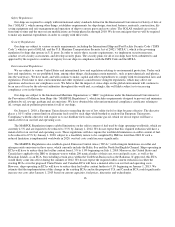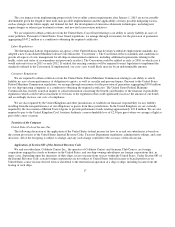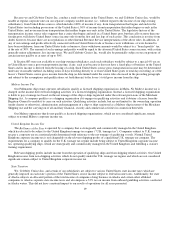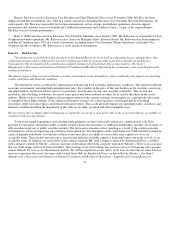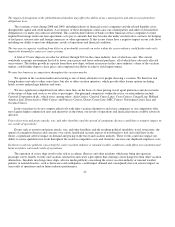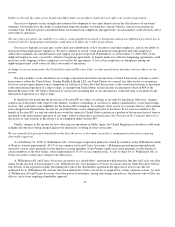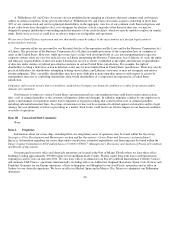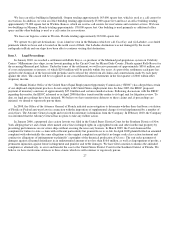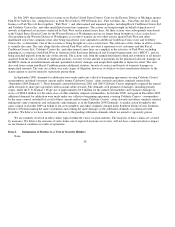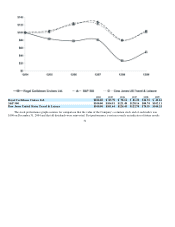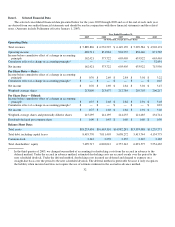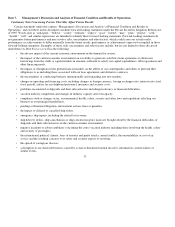Royal Caribbean Cruise Lines 2009 Annual Report Download - page 33
Download and view the complete annual report
Please find page 33 of the 2009 Royal Caribbean Cruise Lines annual report below. You can navigate through the pages in the report by either clicking on the pages listed below, or by using the keyword search tool below to find specific information within the annual report.
E
nvironmental, health and safety, financial responsibility and other maritime regulations could affect operations and increase
operating costs.
The United States and various state and foreign government or regulatory agencies have enacted or are considering new
environmental regulations or policies, such as requiring the use of low sulfur fuels, increasing fuel efficiency requirements or further
restricting emissions that could increase our cost for fuel and adversely impact the cruise vacation industry. An increase in fuel prices
not only impacts our fuel costs, but also some of our other expenses, such as crew travel, freight and commodity prices. In addition,
initiatives to limit greenhouse gas emissions have been introduced or are being considered in several European countries, and
numerous bills related to climate change have been introduced in the United States. Although not all are likely to become law, it is
apparent that future legislation related to climate change could likely impact all businesses including the cruise industry and adversely
impact our costs. Some environmental groups have also lobbied for more stringent regulation of cruise ships and have generated
negative publicity about the cruise vacation industry and its environmental impact. In addition, we are subject to various international,
national, state and local laws, regulations and treaties that govern, among other things, safety standards applicable to our ships, health
and sanitary standards applicable to our passengers, security standards on board our ships and at the ship/port interface areas, and
financial responsibilities to our passengers. These issues are, and we believe will continue to be, an area of focus by the relevant
authorities throughout the world. This could result in the enactment of more stringent regulation of cruise ships that would subject us
to increasing compliance costs in the future.
Conducting business internationally may result in increased costs and other risks.
We operate our business internationally and plan to continue to develop our international presence. Operating internationally
exposes us to a number of risks. Examples include unstable local political or economic conditions and risk of increases in duties and
taxes as well as changes in laws and policies affecting cruising, vacation or maritime businesses, or governing the operations of
foreign-based companies. Additional risks include currency fluctuations, interest rate movements, imposition of trade barriers and
restrictions on repatriation of earnings. If we are unable to address these risks adequately, our financial position and results of
operations could be adversely affected.
We have ship construction contracts which are denominated in euros. While we have entered into euro-denominated forward
contracts to manage a portion of the currency risk associated with these ship construction contracts, we are exposed to fluctuations in
the euro exchange rate for the portion of the ship construction contracts that has not been hedged. If the shipyard is unable to perform
under the related ship construction contract, any foreign currency hedges that were entered into to manage the currency risk would
need to be terminated. Termination of these contracts could result in a significant loss.
Our attempts to expand our business into new markets may not be successful.
Historically our focus has been to serve the North American cruise market, which continues to be our primary source of cruise
passengers. We have expanded our focus to increase our international passenger sourcing, most recently, in the Brazilian, Asian and
Australian markets. Expansion into new markets requires significant levels of investment. There can be no assurance that these
markets will develop as anticipated or that we will have success in these markets, and if we do not, we may be unable to recover our
investment, which could adversely impact our business, financial condition and results of operations.
Ship construction delays or mechanical faults may result in cancellation of cruises or unscheduled drydocks and repairs and thus
adversely affect our results of operations.
We depend on shipyards to construct and deliver our cruise ships on a timely basis and in good working order. The sophisticated
nature of building a ship involves risks. Delays or mechanical faults in ship construction have in the past and may in the future result
in delays or cancellation of cruises or necessitate unscheduled drydocks and repairs of ships. We have, for example, experienced
mechanical problems with the pod propulsion units on certain ships and there can be no assurance that we will not experience such
problems in the future. These events and any related adverse publicity could result in lost revenue, increased operating expenses, or
both, and thus adversely affect our results of operations.
23





